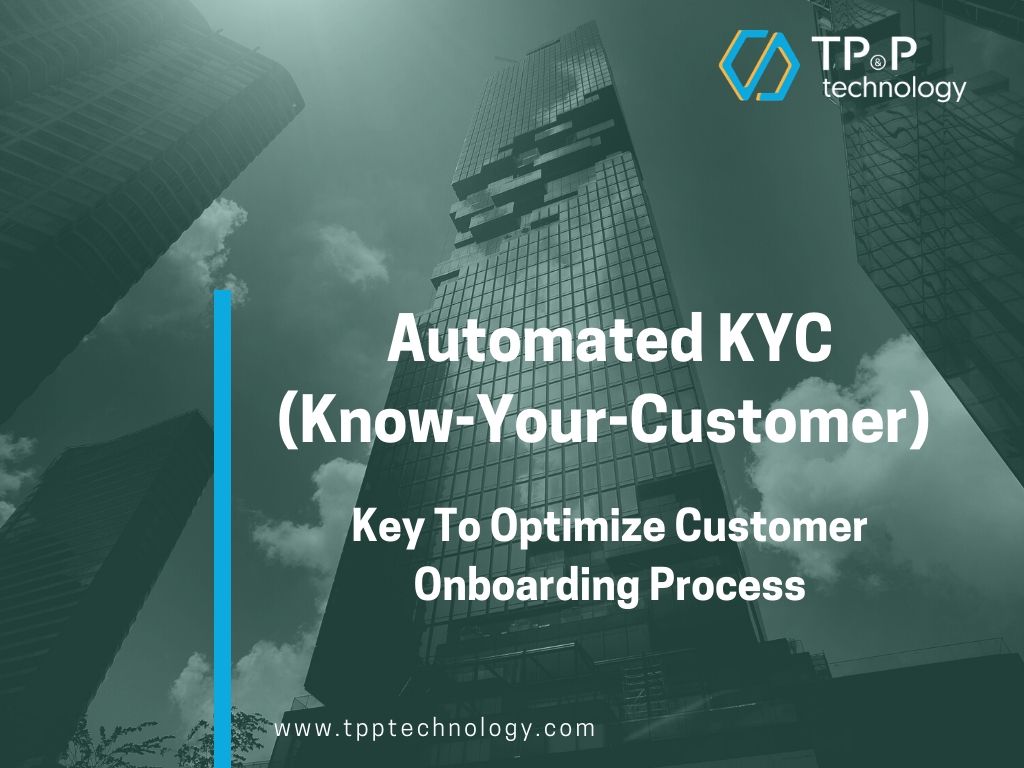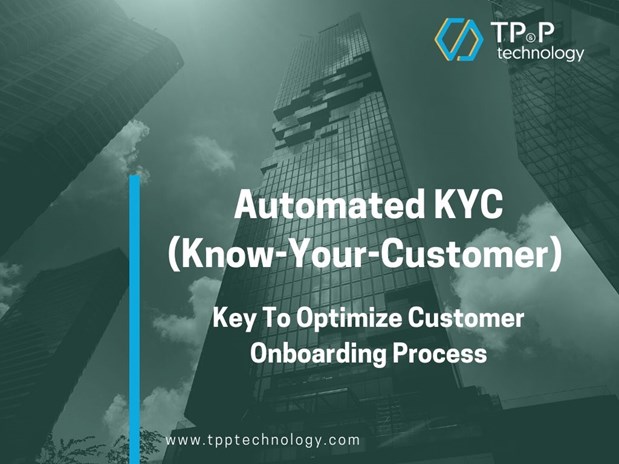
Automated Know-Your-Customer (KYC) Process To Improve Customer Onboarding Experience
Today, in the new digital economy, customer satisfaction is key to business success. In many business industries, customer is at the heart of everything companies do. Especially, in the financial services industry, where success is increasingly about providing customers a pleasant experience, in order to attract, and retain their loyalty.
Being able to offer a frictionless and smooth onboarding experience will not only help banks and financial institutions ("FIs") to acquire new customers and increase business result, but also provide them with a much needed competitive advantage in the digital age.
Many companies, nowaday, are investing a lot of money into optimizing and enhancing their customer onboarding process, with a goal of differentiating themselves from competitors.
Why is customer onboarding important?
In the context of this article, onboarding can be simply referred to as the process which users undergo when they jumpstart their journey as a customer of a bank or FinTech services provider.
Onboarding experience is highly important because it is the very first opportunity for banks and FIs to win over customers and nurture the relationship for further businesses.
When it comes to onboarding, the process will involve a host of legal standards and regulations which businesses need to comply with, including KYC (Know-Your-Customer), AML (Anti-money-laundering) – requiring banks and financial institutions to verify their customer’s identity against public record databases and other watch lists, before users’ accounts can be opened and transacting through the system.
Additionally, banks and financial institutions must continue to monitor existing customers on a frequent basis according to regulations.
Currently, the process which many banks and FIs follow to carry out KYC requires involvement of multiple departments such as front office, legal, and credit assessment etc. making the process long and complicated.
According to digital banking report, 19% of new customers abandoned their online account opening applications before completion. Thus, being able to reduce onboarding time through automation should be seriously considered by business.
Who needs KYC?
Businesses and organizations that belong to the category of “regulated sector” needs KYC. Those entities need to comply with the Anti-Money Laundering (AML) regulations as per local authority’s directives.
These include:
- Banks and credit institutions including insurance companies
- Fintech services provider such as: Mobile E-wallet services, e-currency services
- Foreign exchange broker
- Digital currency/Cryptocurrencies exchange
- Etc.
Businesses that fall under this category, especially Fintech start-ups are increasingly on the rise. A robust KYC procedure is necessary for these organizations, to ensure quick onboarding, and customer satisfaction.
Traditional KYC - Difficulties
The traditional methods adopted by banks and financial institutions for KYC processing have been proven challenging to on-board customers quickly while meeting regulations, due to a number of reasons:
Changing regulations
In the digital age of business, where innovative technologies and products are being introduced on a frequent basis – regulations also evolve to keep banks and FinTech companies adjust with the new financial climate. For example, ten years ago, cryptocurrencies were not traded on public exchanged and mobile e-wallet app were not existed back then.
New FinTech solutions introduce new regulations and, thereby requiring banks and financial services companies to amend and staying up-to-date with new standards – as well as re-visiting their onboarding process to keep up with users’ demand, while staying compliant with new regulations
Technology
Many banks and insurance companies are still operating on outdated legacy systems which require intensive manual input involving human.
For example, many financial institutions still require customers to visit physical branch and submit paperwork for KYC and AML, while customers are increasingly expecting the whole on-boarding process, including KYC, to be completed online, digitally. Providing end-to-end digital experience to users still seems to be a considerable challenge.
With the advancement of modern technologies, banks are capable of optimizing their onboarding process by leveraging new technologies such as AI and Machine Learning, or RPA. However, a balancing approach is necessary to make it work here.
Time-consuming processes
A typical KYC process would encompass the verification for multitude of documents, at various touch points and involving personnel from different departments. This means the whole process is long and time-consuming. Moreover, if a financial institutions holding multiple entities providing different line of financial services under the same corporate umbrella, KYC processing sometimes can be repeated for the same customer (e.g. one customer applying for two different services of account opening and lending).
Customers who find initial on-boarding that is too complicated and/or time-consuming may find it frustrating and become unwilling to conduct further business after the initial account opening.
Time for digital transformation
The above mentioned aspects cause excessive delays in the process of onboarding new customers. This might potentially harm the relationship between customers and financial institutions, right out of the start, making those organizations at risk of competition where customers leaving for competitors such as FinTech start-ups offering better end-to-end and digitally automated services.
More importantly, increase in onboarding time can lead to rising in customers leaving, ultimately result in financial institutions losing on revenue.
Financial services companies who know how to apply cutting-edge, and innovative technology solutions will become agile and flexible enough, to provide their customers with a fast, seamless and pleasant onboarding experience – winning them over and set the stage for further on-going business, while at the same time meeting regulations.
Banks and financial institutions need to put customers at everything they do, without compromising on AML obligations, in order to remain competitive in the new digital economy.
Taking action
The new type of FinTech and digital banking present as a real challenge for the market dominance of traditional banks and financial institutions. In order to thrive and compete, those traditional organizations need to optimize their onboarding processes by incorporating innovative technologies across business.
By applying advanced technologies into their customer diligence processes, traditional financial institutions and banks can solve the problem of unnecessary delays found in the existing outdated KYC protocol – ensuring compliance with regulations.
Leveraging innovative technology
By forming partnerships with technology provider who is capable of helping to implement dedicated cutting edge solutions to help banks compete and carry out their digital transformation, simplifying their onboarding process to become more effective.
Advanced technologies, specifically Artificial Intelligence, including OCR (Optical character Recognition) and natural language processing (NLP) have been proven effective to help banks automate their KYC process, reducing onboarding time while enhancing due diligence.
TP&P Technology’s KYCos platform, powered by AI technology with facial recognition and live-check, can perform identity documents verification, allowing customers to perform KYC through their mobile devices for speedy account opening and approval.
In comparison to human, AI technologies can automate many aspects of KYC, enabling multiple KYC checks executed simultaneously, and can be run 24/7, 365 days, automatically flag any adverse media and immediately report to compliance team the instant such activity happened.
Not only automated KYC solution can help banks and insurance companies combat and prevent frauds, it can also help streamline the onboarding process so that opening account and transacting can be as smooth and painless.
Conclusion
To optimize and solve the challenges found in the current onboarding process, banks will need to innovate and adopt “smarter” solutions that can automates and speed-up identity, and legal documents verification checks – enabling them to open new accounts or approve loans faster, more efficiently.
Collectively, banks and FinTech companies, as well as other financial institutions should consider a robust platform that is flexible, easy-to-use and scalable that can help eliminating manual tasks and allow them to adapt to the continuously changing of regulations.
Also, Banks and FIs should look for easy-to-use software solution that can improves onboarding experience in the self-service channels as well as in person, allowing both users and bank employees to scan ID using mobile device, making account openings and approval easier and quicker.
Contact TP&P Technology to discover our KYCos solution to reduce KYC/CDD complexity and speed up your customer onboarding process.



